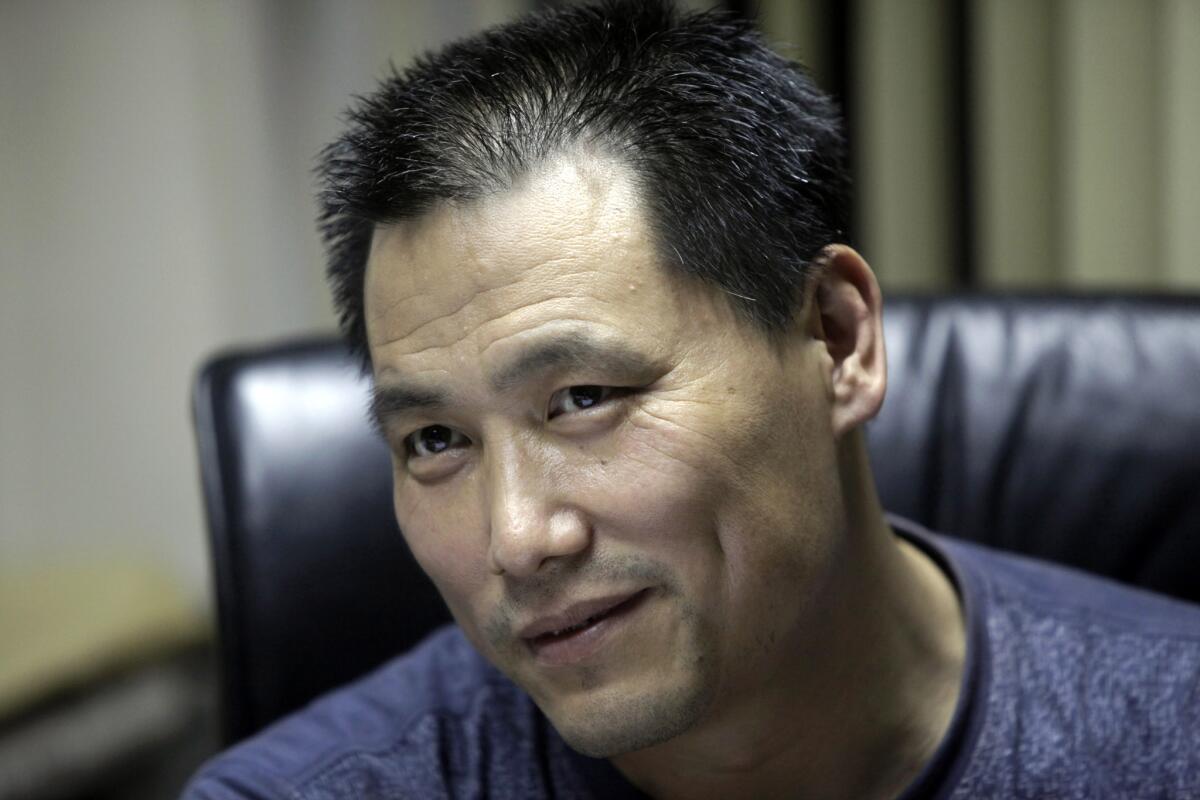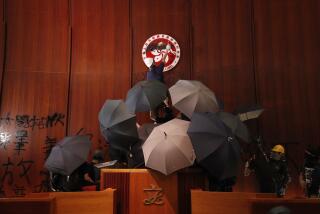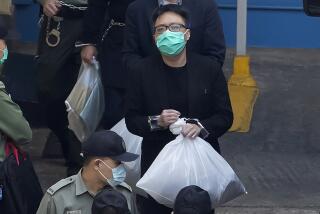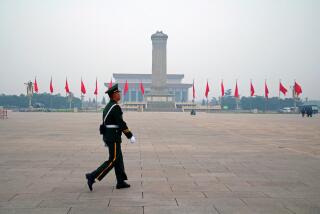He was spared prison, but Chinese lawyer Pu Zhiqiang still has ‘sword hanging over his head’

In this 2010 file photo, Chinese attorney Pu Zhiqiang speaks during an interview at his office in Beijing.
In 2006, supporters of a prominent Chinese human rights lawyer were spared their darkest expectations.
Although authorities found Gao Zhisheng guilty of “subversion,” they handed him a three-year “suspended sentence” with five years of probation, provisionally allowing him to serve his time at home.
Since then, Gao has been apprehended, tortured, released, apprehended again, and tortured again, even more severely. By the time he was last released, in August 2014, he was “utterly destroyed” by his time in jail, the advocacy group Freedom Now said in a statement.
Supporters of another famed Chinese human rights lawyer, Pu Zhiqiang, who on Tuesday was handed a three-year suspended sentence with three years’ probation, fear he could meet a similar fate.
Joshua Rosenzweig, a Hong Kong-based independent researcher focused on human rights and criminal justice issues in China, noted the parallels between the two cases. Pu has “a sword hanging over his head for the next three years, and he’s very much at the mercy of the authorities,” he said.
On Tuesday morning, the Beijing No. 2 Intermediate People’s Court announced that Pu, 50, had been found guilty of “picking quarrels and causing disturbances” and “inciting ethnic hatred” for criticizing the government in seven social media posts. State media described the sentence as “light”; together, the two charges carried a potential jail term of up to eight years.
Yet Pu’s supporters called the sentence — which dictates that he will be monitored for three years, and jailed for another three if he violates the terms of his probation — an act of political persecution and an attack on freedom of speech. The sentence will effectively end his legal career.
“He is no criminal, and this guilty verdict effectively shackles one of China’s bravest champions of human rights from practicing law,” William Nee, China Researcher at Amnesty International, said in a statement.
Shang Baojun, one of Pu’s attorneys, said in a telephone interview that he still believes in his client’s innocence.
“He told us he wants to express gratitude to all of his supporters,” Shang said. “He will tell them face to face when time is right.” Although the state-run New China News Agency said that Pu would not appeal, Shang noted that his client still legally has 10 days to decide. “Either way, we would support him,” he said.
Pu was detained in May 2014 after he participated in a private commemoration of the 25th anniversary of the Tiananmen Square massacre, and he was formally arrested that June. During his time behind bars, authorities whittled down the charges against him until he stood accused of sending seven critical tweets between 2011 and 2014. One mocked the government’s bungled response to a high-speed train crash that killed 40 people; others criticized the government’s policies in Tibet and the ethnically riven northwestern region Xinjiang.
On Dec. 14, nearly 19 months after his detention, authorities tried Pu at the Beijing court, as plainclothes police shoved and harassed journalists, diplomats and supporters under hazy skies outside. The trial drew scorn from both human rights groups and foreign governments. It seeped into the U.S. presidential campaign as Sen. Marco Rubio called the “spectacle” of the trial — and the fracas outside — “a mockery of justice and rule of law.”
Pu, known as China’s “Giant Lawyer” for his commanding height and baritone voice, has gained a massive following as an acerbic critic of government policy; he racked up tens of thousands of fans on social media sites before government censors blocked his accounts. He has represented a diverse array of clients, including dissident artist Ai Weiwei and victims of a draconian (and now abolished) “re-education through labor” system.
Pu will be forced to spend 10 days under “residential surveillance” at a location assigned to him by authorities before he is allowed to go home, Mo Shaoping, a second lawyer for Pu, told Reuters.
The New China News Agency said on Tuesday that Pu was “given a light punishment after a public trial as he confessed his crime honestly, pleaded guilty and repented his guilt.”
“His widely viewed and shared posts stirred ethnic hatred among Internet users, triggering an antagonistic mentality in many and creating a severe social impact,” the agency continued.
Yet many of Pu’s supporters were still outraged that he would be found guilty of a crime.
“The court should only deem Pu Zhiqiang not guilty and release him, and then he should seek justice for being jailed for 600 days,” Murong Xuecun, an author and free speech advocate in Beijing, tweeted on Tuesday. “Apart from this, any sentence is an act of political persecution, and any sentence is a stain on the law.”
Rosenzweig said that the verdict will strip Pu of his legal credentials, as China’s Ministry of Justice bars convicted criminals from working as attorneys. “I’d say that there are signs of this verdict being a kind of compromise,” he added. “Certainly he could have been sentenced to prison time — and possibly significant prison time.”
Activists and human rights groups say that Chinese President Xi Jinping has presided over the country’s most intense crackdown on dissent in decades, persecuting and intimidating Communist Party critics of all stripes, including journalists, human rights lawyers, religious figures, bloggers and feminist activists.
“It goes without saying that this conviction is farcical to begin with,” Rosenzweig continued. “So what we’re talking about are the technicalities of this point, of what this means. I wouldn’t try to paint any larger picture of this being a watershed, or this being any sort of turning point in the repression of dissidents.”
The sentence will take effect after Pu’s appeal period has ended, rights lawyer Liu Xiaoyuan said in a telephone interview. Liu added that if Pu does return to jail, the time he already has served will be deducted from his final sentence.
“He has already paid a huge price in this case,” Liu said.
Alexandra Li and Tommy Yang in The Times’ Beijing bureau contributed to this report.
Follow @JRKaiman on Twitter for news from Asia
More to Read
Start your day right
Sign up for Essential California for news, features and recommendations from the L.A. Times and beyond in your inbox six days a week.
You may occasionally receive promotional content from the Los Angeles Times.






